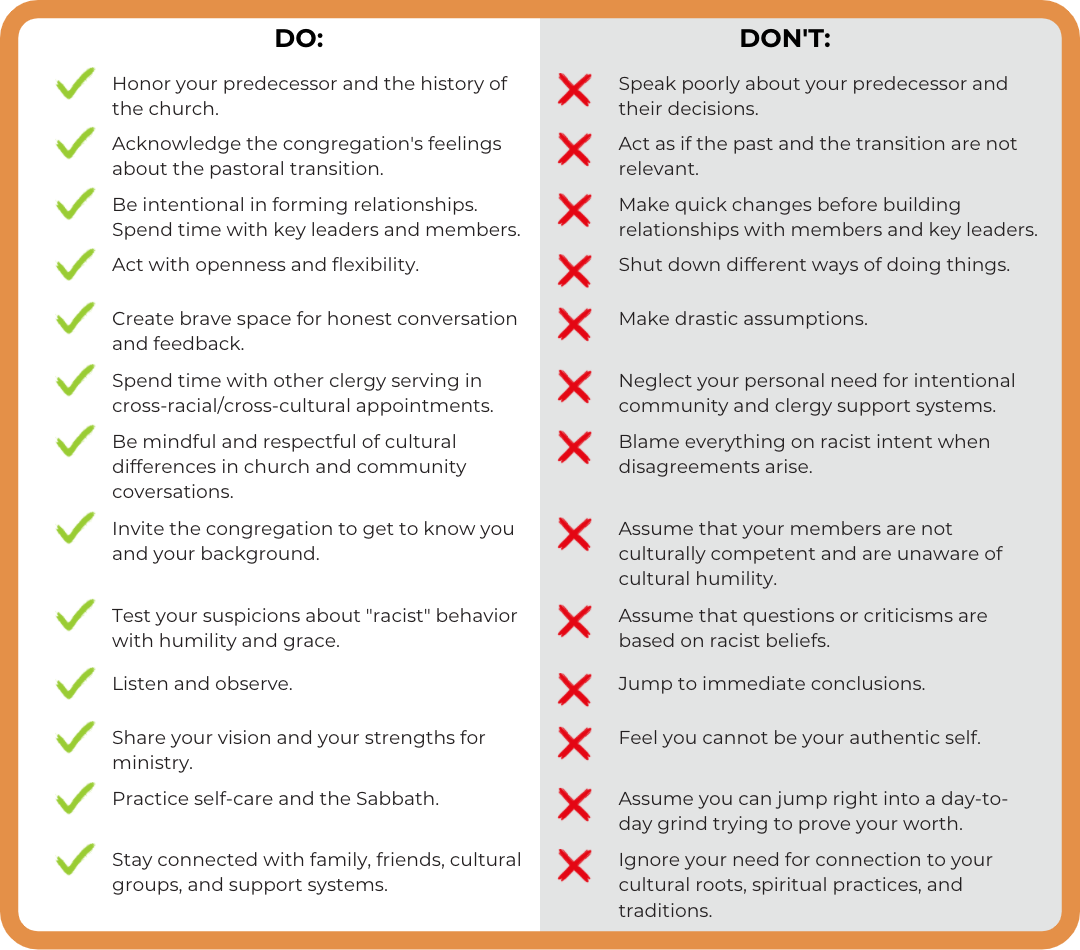Do’s & Don’ts for Incoming Cross-Racial & Cross-Cultural Pastors
Transitions are not always easy. For some, it can be difficult. However, faith leaders need to do everything possible to encourage a healthy pastoral transition. Cross-Racial and Cross-Cultural (CRCC) ministry settings are sacred and should be intentional. This is not a complete list and CRCC pastoral ministries are not monolithic. This simple guideline is intended to support the incoming pastor with some Do’s and Don’ts as they begin their new ministry.
Below the graphic you’ll find a full readout of the text it contains. This helps aid accessibility, particular for those using screen-reading software.
Do:
Honor your predecessor and the history of the church.
Acknowledge the congregation’s feelings about the pastoral transition.
Be intentional in forming relationships. Spend time with key leaders and members.
Act with openness and flexibility.
Create brave space for honest conversation and feedback.
Spend time with other clergy serving in cross-racial/cross-cultural appointments.
Be mindful and respectful of cultural* differences in church and community conversations.
Invite the congregation to get to know you and your background.
Test your suspicions about “racist” behavior with humility and grace.
Listen and observe.
Share your vision and your strengths for ministry.
Practice self-care and the Sabbath.
Stay connected with family, friends, cultural groups, and support systems.
Don’t:
Speak poorly about your predecessor and their decisions.
Act as if the past and the transition are not relevant.
Make quick changes before building relationships with members and key leaders.
Shut down different ways of doing things.
Make drastic assumptions.
Neglect your personal need for intentional community and clergy support systems.
Blame everything on racist intent when disagreements arise.
Assume that your members are not culturally competent and are unaware of cultural humility. *
Assume that questions or criticisms are based on racist beliefs.
Jump to immediate conclusions.
Feel you cannot be your authentic self.
Assume you can jump right into a day-to-day grind trying to prove your worth.
Ignore your need for connection to your cultural roots, spiritual practices, and traditions.
Definitions:
*Culture/Cultural: A learned set of values, beliefs, customs, norms, and perceptions (often unstated but nonetheless communicated) shared by a group of people that provide a general design for living, a pattern for interpreting life, and the lens through which to interact with and evaluate self and other individuals and groups.
*Cultural Humility: A way to engage people and groups across cultural differences while understanding and acknowledging systems of oppression, including how one’s own cultural group might benefit from such oppression. Cultural humility includes a commitment to self-evaluation and self-critique and seeking partnerships with people and groups working to eradicate power differentials at the systemic level.


